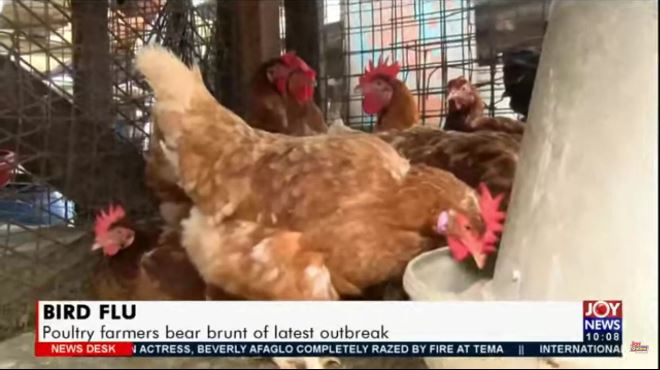The National Chairman of the Poultry Farmers Association, Victor Oppong has called for immediate intervention to salvage the country's poultry industry from collapse.
“The poultry industry is on the verge of collapse, people are selling their birds prematurely and it’s about time that an immediate intervention is done to it,” he said on Wednesday.
Mr Oppong who was speaking on JoyNews’ AM Show, said the industry is faced with a challenge relating to feed, particularly, the maize, soya, and the wheat bran, “so that is how the poultry industry is suffering.”
Maize, he said takes about 50 – 60 per cent of the feed input, Soya takes about 15 – 20 per cent leaving the remaining percentage for wheat bran and other minor feed.
“So the moment the price of Maize goes up, it affects everything and that is how the industry is suffering. I can say that it is not only suffering but at the verge of collapse,” he stressed.
According to him, the cost of feed has increased by over 100 per cent, pressuring farmers to adjust the prices of the eggs.
“Last year, we were buying 50-kilos of maize at Gh¢65.00 but as we speak now, we are buying the same 50-kilos at Gh¢150.00 which is more than 100% increase,” he said.
Mr Victor Oppong added, “Soya which was about Gh¢140.00 per 50-kilos is now Gh¢210.00 and wheat bran which was about Gh¢15.00 – Gh¢20.00 per 25-kilos is now Gh¢45.00. So, now you could see that the basic or main ingredient of the feed has increased over 100 per cent that Is why we adjusted the price of eggs.”
A single egg which was sold at Gh¢1.00 for the past three years, the Chairman noted, gave a profit margin of about 8.00 difference between the farm gate and the final consumer as the 30 pieces crate was sold at Gh¢22.00.
“But we all know that with eggs tray, the profit margin is between Gh¢1.00 and Gh¢2.00, so even if we have increased the prices by that margin, I don’t think it will affect the final consumer.”
Mr Oppong noted that, “as we speak now, one egg is sold at Gh¢1.20 pesewas, some Gh¢1.50 pesewas which comes to Gh¢36.00 and Gh¢45.00. So, I don’t think it’s a bother if we also try to adjust our prices because of the feed whose price has gone up by 100%.”
He, therefore, appealed to the government, to as a matter of urgency get fertilizers for farmers to aid in maize production.
“We are pleading with the government, I understand now they are not even getting the fertilizers which is also a challenge, so the government should try as much as possible to get the fertilizers to the farmers so that they can also use them to produce the maize for the local industry.”
The problem, he said, originated when the neighbouring countries started, “purchasing our maize to their various countries and we thought they will be stopped, but we allowed them to buy all the maize from this country.”
He said although the yield has increased because of the Planting for Food and Jobs Programme, “we allowed the neighbouring countries to buy the maize and we in turn suffer and later we had to import maize as the market enlarges."
“As we speak, people are trying to bring maize from Côte d'Ivoire and other countries but still prices are very high and that’s how it’s affecting the industry, except that the wheat bran is produced locally but still sometimes, you will not even get the local one. We have to import,” Mr Victor Oppong revealed.
“I understand they are also exporting to various countries so that is how the poultry industry is suffering. If the feed cost goes up, it affects everything in the industry,” he lamented.
Latest Stories
-
Today’s Front pages: Wednesday, February 19,2025
2 minutes -
‘Died for stealing chocolate’: Pakistan anger over death of child maid
7 minutes -
Nigeria’s inflation rate drops after statistics overhauled and updated
12 minutes -
Rubio snubs South Africa’s G20 meeting amid diplomatic tensions
21 minutes -
Burkina Faso: new jihadist attack on the town of Djibo in the north of the country
21 minutes -
Meghan puts new label on jams and lifestyle range
2 hours -
VRA Ladies Association refutes allegations against Acting CE Obeng Kenzo
2 hours -
Ghanaian students bag scholarships and excel at University of Nottingham
2 hours -
Stanbic Bank ignites discussion on relationship financial boundaries
2 hours -
You need not start marriage in debt – Banking Executive
2 hours -
T-bills: Government to borrow GH¢7.73bn on Friday; yields to continue falling
3 hours -
Understanding flankers and cash cows in brand sustainability
3 hours -
Prove your relevance, silence the doubts – Mahama to Council of State
3 hours -
Bond market: Trading activity surges 92.48% to GH¢1.83bn
3 hours -
Ghana plans return to domestic bond market in second quarter of 2025
3 hours

